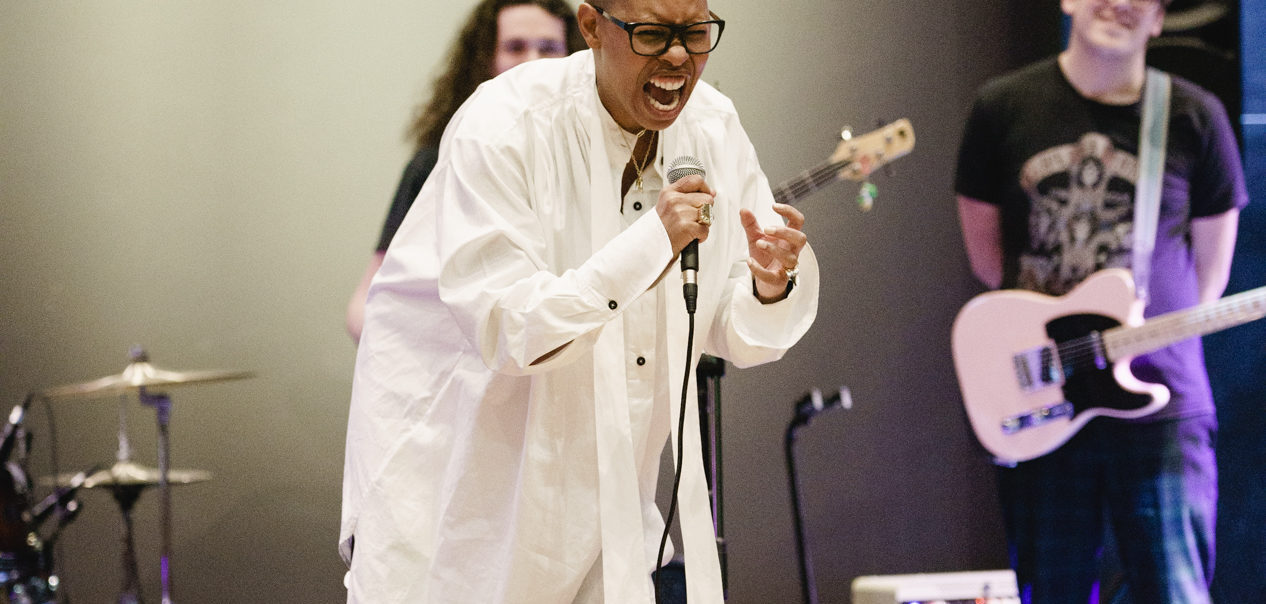Events and workshops in an age of lockdown

Where do I start? How are you? I hope you are keeping well.
Guest speakers, visiting professional talks, workshop presenters, collaborators, supporters and sponsors, I never underestimate the contribution to learning that all our guest artists, creatives and performers play, in helping students to make sense of the creative landscape, and prepare for the real world challenges that they face after graduation.
In early March, Leeds Arts University opened the doors and welcomed Skin, acclaimed recording artist, DJ and lead singer of multi-million selling rock band, Skunk Anansie to share insight into her approach to performance song writing, singing and the development of her own unique style.
Skin led an afternoon masterclass for Level 4 and Level 5 BMus (Hons) Popular Music Performance students where she shared advice on song writing – ‘have something to say, people will know if you’re not being genuine’ – her personal taste in music, from Rage Against the Machine to Billie Holiday; and fighting through performance nerves. On being in a band, she explained the importance of leaving your ego at the door, listening to everyone’s ideas and always reaching slightly beyond your grasp.
The highlight of the afternoon were the students’ band performances including some of Skunk Anansie’s most memorable hits, such as Brazen (Weep), Twisted and Weak; as well as students’ own original songs. Skin gave thoughtful and generous feedback, noting the high standard and encouraging students to connect with the audience. Skin described working with the students as an ‘awesome experience’ and was heartened by the amount of talent in the room.
In the evening, at a public event, Skin spoke openly about her formative years in Brixton, south London and spanned her career from developing her technique as a jazz singer; the mistakes she made with her first band, Mama Wild; Skunk Anansie’s first Top of The Pops and headlining Glastonbury; to her most recent appearance as the duck on The Masked Singer.
She also spoke of the prejudice that she has experienced as a powerful black woman singing in a genre traditionally dominated by white men.
In summary, Skin was inspirational.
From an amazing high to an incredible low. By the end of March, things had changed, Covid-19 threatens, social distancing is the norm, our doors are now closed, the future remains uncertain, and we all have to adapt and learn new ways of working.
The need for our students to connect with, and learn from other artists, creatives and performers, is arguably greater than ever. I would like to share some of the ways in which we are keeping those communication channels open.
We are embracing technology to support our services. Who isn’t? Google Meet , Zoom, Microsoft Teams and the Cloud have quickly become our new friends.
Technology is enabling us to support our existing processes and, at the same time, explore entirely new ways of working.
For example, bookings for guidance appointments are already managed through an online platform so this process is unchanged but the guidance appointment now takes place in a virtual meeting space. Yes, we have had some awkward moments and some comical mishaps along the way but we are all getting to grips with the technology. We have both increased the availability of virtual appointments and created some virtual drop in sessions. The uptake and feedback from students has been positive.
Our Events and Workshop schedule has been most affected by the lockdown. Almost all events and workshops are delivered by artists, creatives and performers. Nonetheless, we are seeing this as an opportunity to try new approaches.
Before Easter we successfully trialled a number of online webinars with different presenters. The trials worked well. Student participation was high and feedback positive. We are currently working with other partners to adapt their presentations and workshops so that we can deliver more online workshops and webinars in the next few weeks.
It’s early days but I have reasons to be optimistic about providing a virtual alternative.
- Capacity is not an issue. We have been able to invite students, and attract interest from students, across levels and across disciplines to participate.
- Room availability is not a problem. We agree a time and create an appropriate space to host the event.
- Students are engaging with online events.
- Virtual attendance has been high with fewer no shows.
- Anecdotally, engagement seems to be higher with a greater degree of interaction between attendees and presenters. I suspect the virtual environment is less threatening for students.
- We are able to attract international based presenters. For example, we recently hosted a webinar with a New York based creative.
- There are many professionals, currently available through furlough, who are more generous with their time.
- Feedback from students, presenters and staff has been positive.
So, in times when we all may be feeling a little more isolated I am finding it reassuring that we are able to find ways for our students to engage with engage with, and learn from other artists, creatives and performers.
Yes I do look forward to the day when we can welcome people back to events on campus. In the meantime, its fair to say that we are all trying to make sense of our current landscape and prepare to to work through the real life challenges that await us all.
Finally, online or offline. At this point in time, it is genuinely refreshing to feel that when someone asks “how are you?” they are not asking out of politeness. They genuinely care about your response.
Take care, keep well.
Andrew Jones, Head of Careers, Employability and Enterprise at Leeds Arts University
Photo of Skin (c) Martine Lund, BA (Hons) Photography, L5 student at Leeds Arts University
